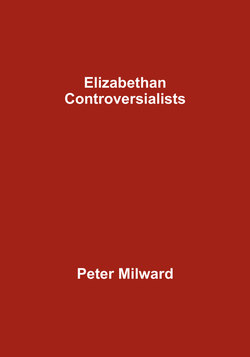Elizabethan Controversialists

Реклама. ООО «ЛитРес», ИНН: 7719571260.
Оглавление
Peter Milward. Elizabethan Controversialists
Elizabethan Controversialists. Peter Milward
Preface
Introduction. In Defence of Controversies
The Anglican Challenge. a) The Anglican Challenger, John Jewel (1522-71)
b) The Catholic Champion, Thomas Harding (1516-72)
c) The Counterblaster, Thomas Stapleton (1535-98)
Puritan Admonition. a) The Brief Discourser, Robert Cowley (1518-88)
b) The Admonishers of Parliament, Thomas Wilcox (1549-1608), John Field (d.1588)
c) The Anglican Defender, John Whitgift (1530-1604)
d) The Puritan Replier, Thomas Cartwright (1535-1603)
Catholic Reasons. a) The Mover of Motives, Richard Bristow (1538-81)
b) Two Jesuit Champions, Edmund Campion (1540-81), Robert Persons (1546-1610)
c) The Defender of Catholics, William Allen (1532-94)
Presbyterian Discipline. a) The Baiter of Bishops, Martin Marprelate (fl.1588-89)
b) The Anonymous Answerer, Job Throkmorton (1545-1601)
c) The Marrer of Martin, Richard Bancroft (1544-1610)
d) The Judicious Divine, Richard Hooker (1554-1600)
Appellant Considerations. a) The Anonymous Accusers
b) The Quodlibetical Questioner, William Watson (1558-1603)
c) The Polypragmatical Apologist, Robert Persons (1546-1610)
Appendix. Shakespeare and the Controversies of His Time
Отрывок из книги
Some years ago I published a book entitled Religious Controversies of the Elizabethan Age (London, Scolar Press, 1977), with the sub-title, “A Survey of Printed Sources”. In its pages I dealt with some 630 printed books and pamphlets of religious controversy published mainly during the 45 years of Queen Elizabeth’s reign, giving the title of each in full and linking the titles with each other in a running commentary so as to bring out their logical as well as their chronological order. The titles alone may have served to convey some idea of the contents of the controversies and of the spirit in which the authors approached their respective subjects, but for the time being I explored the contents no further, considering it more than enough, from a bibliographical point of view, to have established their main outline.
Now in this sequel it is my aim to enter into the contents of each major controversy, following a method parallel to that of my former book, replacing the full titles of the books and pamphlets with selected passages culled from them. Thus, whereas the former book was a kind of catalogue of long titles linked together by commentary, this is a kind of anthology with the passages linked together with a minimum of commentary. For it seems to me that first-hand extracts from the controversies, whose contents will inevitably be unfamiliar to the majority of my readers, will be more enlightening than any second-hand narration.
.....
Here perhaps, rather than in the political or social conditions or literary writings of the time, are to be found the seeds of the subsequent development of modern England. The swirling controversies were a kind of typhoon or hurricane determining the pattern of the weather for miles around and for days on end. Nothing like them had been known in England before, and nothing like them appeared after they had finally blown over, with the outbreak of civil war and the beheading of a king. In their midst – though this is a truth that has been strangely overlooked by both historians and literary scholars – appeared the greatest genius in English literature, William Shakespeare, with his immensely varied genius for both comedy and tragedy, not to mention history. How, we may wonder, was Shakespeare himself affected by all these controversies? No doubt, as I have suggested, his feeling was one of disgust, not in the skeptical spirit of the above-mentioned reviewer, but as one who hates to see what Hamlet calls “sweet religion” converted into a mere “rhapsody of words” (iii.4). Far more than Hooker, he was able to rise above them, not out of uncommitted indifference to them but in the deep desire, even within the limits of drama, to bring about a practical solution to them.
Here is, in fact, my own motive in exploring once more this hotly disputed ground of old. In the first place, it is my aim as a student of Shakespeare’s plays, to enter as deeply as possible into the heart of their mystery, not in order to pluck it out with the rudeness of a Rosencrantz but to leave it there with all due reverence. Secondly, it isn’t enough for me to understand the plays themselves, but through them I wish to enter more deeply into the heart of England and of that humanity which is so dramatically represented in them. For the more I peruse the plays and the controversies together, the more convinced I become of their intimate connection. Not that I can lay a precise finger on the connection, saying “Here it is!” or “There it is!” Rather, it is at once here, there and everywhere, as the soul is said by scholastic philosophers to be present in the body, “whole in the whole, and whole in every part”.
.....